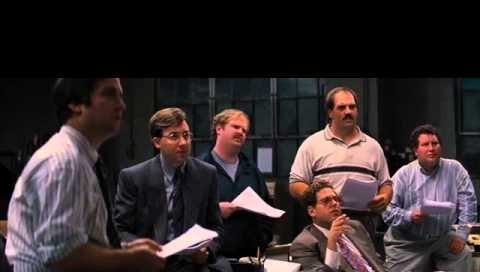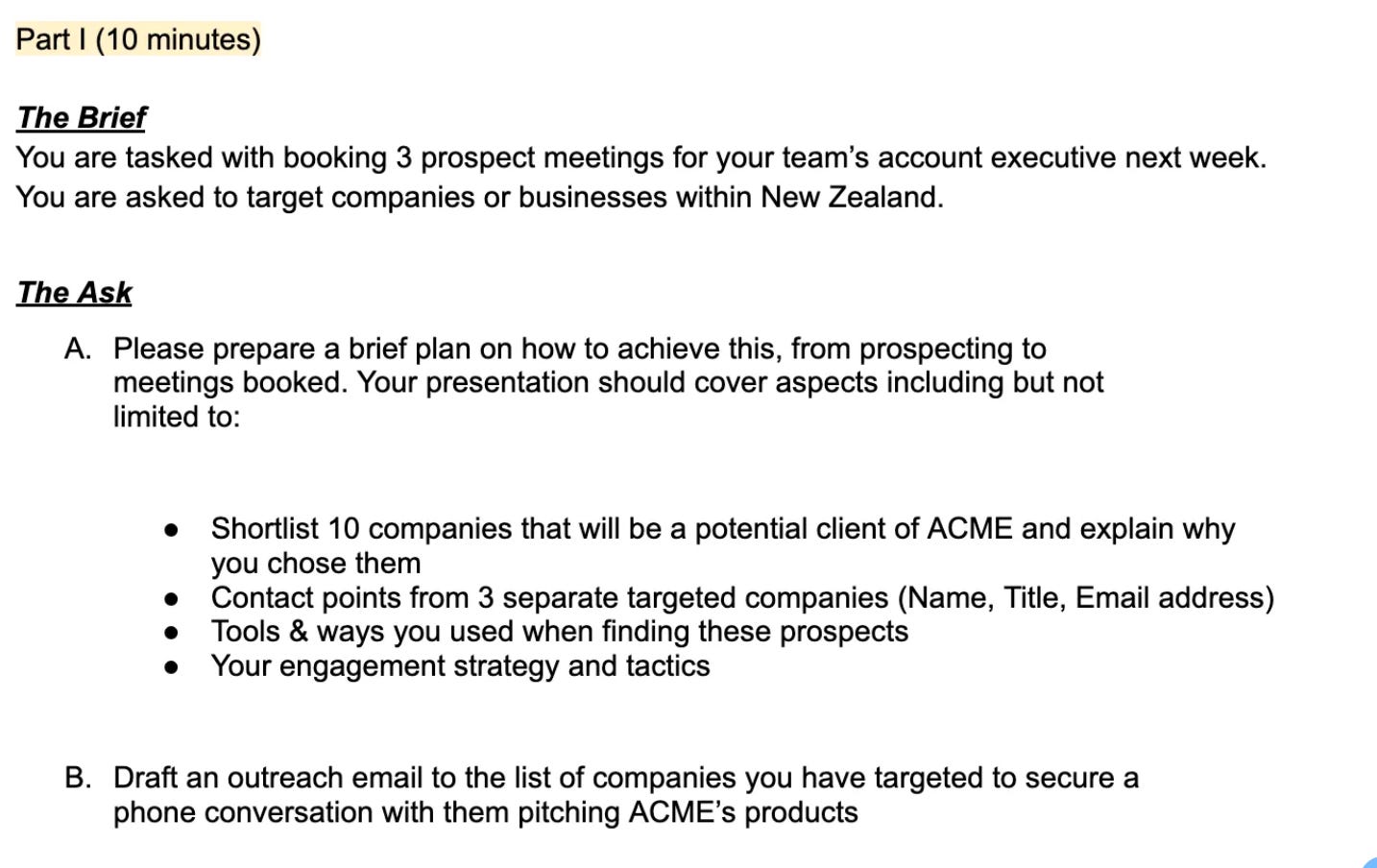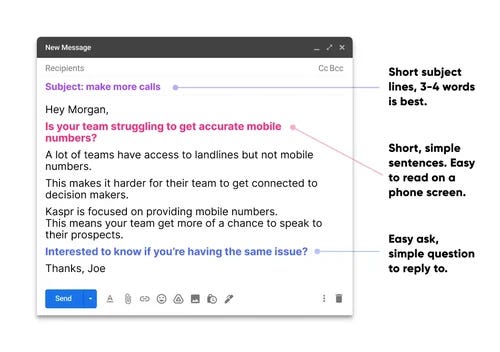Hiring BDRs (in startups)
When you have no money, resources & branding to attract talent, you have to be highly resourceful in hiring. This is how I hired my BDR in 30 days. And he's killing it.
👋 Hey, it’s Ernest and welcome to my newsletter where I share learnings, insights and observations from the trenches, based on 5+ years of experience in tech sales & outbound prospecting.
I’ve had the privilege of being in 3 hiring cycles, and have crafted a tight process to hiring BDRs as an early stage startup, full breakdown below 💁♂️
All data driven, no wild guesses- just pure process.
I was surprised when we got 13 candidates from my BDR job posting.
It was a week and I expected 100s of candidates that wanted to join our recently funded, high growth startup.
Instead, half the candidates were from Indonesia, India. We wanted to hire locally, so that left us only with 6 decent candidates based in Singapore.
4/6 of them were either under/over-qualified, with either 20 year old or 40 year olds trying their luck with ‘Easy Apply’
Whoever said hiring for sales was easy must have been working at Google or Stripe.
It didn’t matter if we were a venture-backed pre-Series A startup, most candidates still thought that startups were ‘risky’.
One thing that no one tells you about hiring as a startup is that you need to build your hiring pipeline. Unfortunately, nobody knows you or your brand.
Couple that with hiring for your first time BDR (a super entry level role), this becomes even harder because you don’t have decent inbound applying for this roles. (In fact, you get a lot of randos)
You need to ‘hunt’ for these roles; the traditional recruiting methods don’t apply.
Why?
Firstly, you can’t hire for proven track record, because no decent BDR wants to be re-hired for the same role.
And those that wants to do that are either not-so-great BDRs or they will command a much higher base salary that as a startup founder, you will probably find too expensive.
Experienced BDRs will also rather work at more established companies such as Databricks, Datadog where they have a structured BDR program, incredible pantry + benefits and they get flown out to the US for onboarding.
Startups cannot compete at all.
So this is what startup recruiting looks like:
Imagine this: A clip from Wolf of wall street; Jordan Belfort can’t afford to find proper tellers, so ends up recruiting his friends, jack-of-all-trades who’s all sold ‘something’ before. They end up being fantastic BDRs.
Most applicants will be less-than-ideal profiles, and you’ll have to accept that anyway.
The unconventional profiles can be grouped in this 4 categories:
Previous non tech sales jobs: Financial Advisors, Real Estate
Recruiters
Mid-Career switchers: Engineers, teachers, lawyers
Everyone else: Bartenders, baristas, musicians
I realised this early on, and told my recruiter to stop going after the ex-google BDR, as we won’t be a good fit for them anyway.
Instead, let’s double down on profiles 1 and 2 - recruiters and non tech sales roles - and build a sales interview process out for identifying this proxy skills.
Note: Mid-career switchers bring significant value when aligned with selling software related to their industry; for instance, lawyers transitioning into roles selling legaltech software.Since we can’t assess for prior success, we nailed down 4 important traits that would give us confidence that they will succeed:
(I’ve included some bonus traits)
Curiosity
Coachability/Growth Mindset
Resilience
Intelligence/Figure sh*t out
Resourcefulness
Hunger/Ambition
Excellence
The interview process:
I can’t stress the importance of having a tight process. Although early-stage startups may not receive a high volume of applications, this does not justify conducting interviews in an ad-hoc manner or relying solely on gut instincts.
Run every interview process the same, ask the same questions, and use data not emotions to decide on the best hire.
I’ve discovered that some of my top hires, who may not initially excel in the phone screen, may eventually emerge as frontrunners when we score them holistically through the interview process (more on that later).
The interview process:
Phone Screen (20-30 min)
Assignment (Take home)
In Person interview (30-45 min)
Culture fit (optional)
The phone screen
We keep this brief, get some basic understanding of the candidate, share briefly about the role and look for any red flags to disqualify the prospect.
In the call, we cover the following:
Basic HR/admin questions such as benefits, salary, WFH policy
Understand candidate’s background and motivation
Assess how they sound on the phone
Behavioural questions to assess soft skills
The phone screen offers a great to way to assess how do candidates sound on the phone:
Are they speaking too fast, stumbling over words?
Do they sound too colloquial/use slang or sound very professional?
Can they articulate themselves clearly in 30 seconds while keeping me engaged?
Do they sound energetic or tired?
Note: If I’m interviewing an experienced BDR, I would include an additional sales skills interview over zoom to assess their sales process.Assignment (Take home)
The assignment should closely replicate the tasks the candidate will perform in their actual role.
This can differ from company but I’ve included a general one that covers the main 2 responsibilities of any representative: prospecting and outreach.
Since everyone is on the ‘same level’ with no proven track record, the assignment is an excellent opportunity for candidates to differentiate themselves through hard work, preparation and intelligence.
(Note: Intelligence is a key trait I defined earlier)
Here’s an example of how an assignment looks like
Part 1: Written Assignment
In the first half (A), I assess whether the candidate has reviewed the website and case studies, synthesised the information, and demonstrated a coherent understanding of the business.
Candidates are required to email their assignment 24 hours before the face-to-face interview to determine if they will progress.
Note: Detailed presentations never fail to impress, showcasing the candidate's preparation and seriousness about the role. In the second half (B), I expect an outreach email of the following quality:
(This is a 5 minute task to google, but I’m surprised that some still submit ‘essays’ instead of short, concise emails)
Part 2: The cold call roleplay
While not everyone starts off strong on the phones, we need someone that is willing to hustle and pick up the phones.
Some people hate cold calls, and believe they can rely solely on email and LinkedIn. This assignment helps us quickly weed out the non-callers.
Note: Finding a well-rounded candidate for the BDR role is challenging; it's more effective to prioritize and excel in specific skill sets that align with your business requirements.F2F Interview
Part 1 (15 minutes)
During part 1, candidates will present the written assignment they’ve prepared and walk us through the thought process.
Candidates that do well are able to articulate their reasoning clearly, and back their examples up with customer stories and publicly available information.
Part 2 (15 minutes)
For the roleplay, I pretend to be a prospect on the other end of a cold call.
On the call, I’m able to assess the BDR’s opener, value prop and his call to action as per the assignment.
I will also throw a curveball by giving him an objection such as ‘pricing’ or ‘already using a competitor’ and see how the BDR overcomes the objection.
Afterward, I'll provide feedback on areas for improvement and ask the BDR to try again.
This is to test their coachability and see if they can synthesize the feedback and make immediate improvements.
Q&A
Finally, we’ll leave the last 10 minutes for questions. The Q&A front is a good way to assess a candidate’s curiosity and what they value.
Not so good questions: Anything that can be googled
Good questions: Team culture, performance goals, quota attainment, challenges
Once we’ve done the 3 step process, we put it through a scoring card where each candidate is weighted across the 4 traits we’ve determined.
This can be split out into cumulative scores for respective interviews and respective interviewers.
Finally, the offer: $40-$60K base (for a startup!) with a 70-30 split.
(I’ll post separately on salary , compensation vs incentives model)
Additional notes on hiring:
I've had representatives who aced the interview process but didn't perform well in execution once hired. Don’t be afraid to let someone go if it’s not a mutual fit. You’ll know this within the first 4-8 weeks.
The reverse is true. I’ve had a rep that almost did not make it pass the screening round as she seemed nervous/awkward. She ended up beating the rest of the candidates with intelligence and hard work. Don’t discount the non-traditional sales rep.
Rather than posing hypothetical questions (such as strengths and weaknesses), bias for scenario-based questions (like describing a time when you received feedback and how you responded). These types of questions demonstrate past behaviours effectively and minimize the fluff.
There have been a few sales academies recently including earlywork, launchpad and sales school singapore that provide decent talent for first time sales hires.
These reps are great, but better as a second hire so they can model after a sales lead. I’m biased towards the self-taught sales reps who’s able to figure things out by being hands-on first.
I’ve hired > 10 reps, and my top favourite traits are
- those that consistently perform in good/bad months- low ego, easy to manage
- hungry for progression but understands there’s a timeline to it
I recently tracked down the candidates I’ve vetted through and rejected. Interestingly, the ones that scored the lowest ended up moving to a complete different industry, non sales related. And the ones that came close to being hired, ended up in decent companies. Good validation for my process.
One of my favourite sales challenge was the boiler room: We chose the top 5 candidates, put them in a room and gave them 2 hours to cold call through a list, the person that booked the most meetings got the job instantly.
This helped weed out a top candidate who realised he couldn’t see himself doing this for the next 12 months
The introvert came up on top, was relentless and never stopped picking up the phones. He got hired, and ended up being one of the top performers.
If you’re hiring your first sales hire, don’t just go for the Salesforce rep. Choose the rep that’s sold a similar sales cycle, ACV for faster ramp. Even better if you find the first hire of a company, that way you know that despite the startup chaos, this was the growth magician that thrived and has that startup DNA.
Hiring that BDR is a science
Instead of spray-and-pray or going by gut, it’s worth investing time in building a process that keeps you objective amidst the long hiring process.
A bad hire is responsible for 80% of your problems, which you will then invest into coaching, performance improvement plans (PIPs), and eventually restarting the interview process.
Finally, hiring tech sales folks is a privilege!
Empowering mid career switchers to break past the salary bracket, from their past ‘lives’ and have greater freedom
Showing non banking/consulting/software freshers a path to a 6 figure salary
Playing a crucial role in shaping the early career journeys of freshers
Thanks for the read, I’ll catch you for my next post on incentives & commission structures.
Ernest
PS If you found this valuable, here are more ways I can help:
Follow me on LinkedIn for insights during the week (free).
Drop me a note if you wanted to do bespoke consulting on your sales process, from hiring, headcount planning to structuring commissions.
Have you considered incorporating cold calls in your sales outreach process? I recently wrote about making 4000+ cold calls which you might find insightful.













